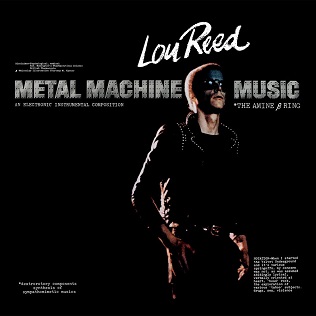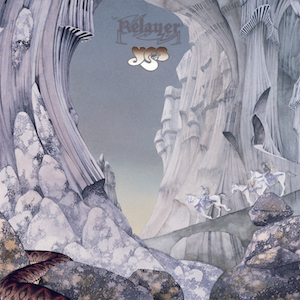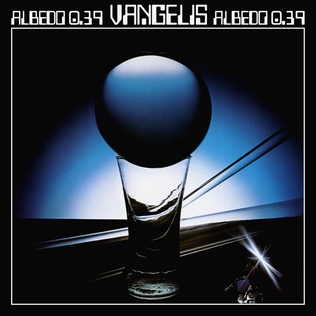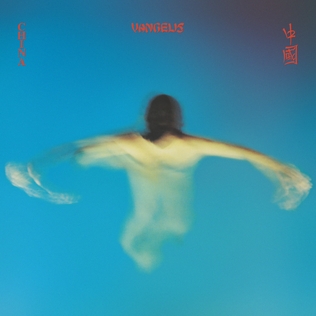
Evángelos Odysséas Papathanassíou, known professionally as Vangelis, is a Greek musician and composer of electronic, progressive, ambient, jazz, and orchestral music. He is best known for his Academy Award-winning score to Chariots of Fire (1981), as well as for composing scores to the films Blade Runner (1982), Missing (1982), Antarctica (1983), The Bounty (1984), 1492: Conquest of Paradise (1992), and Alexander (2004), and for the use of his music in the 1980 PBS documentary series Cosmos: A Personal Voyage by Carl Sagan.

Metal Machine Music is the fifth studio album by American rock musician Lou Reed. It was recorded on a three speed Uher machine and was mastered/engineered by Bob Ludwig. It was released as a double album in July 1975 by RCA Records, but taken off the market three weeks later. A radical departure from the rest of his catalog, the Metal Machine Music album features no songs or recognizably structured compositions, eschewing melody and rhythm for modulated feedback and noise music guitar effects, mixed at varying speeds by Reed. Also in 1975, RCA released a Quadrophonic version of the Metal Machine Music recording that was produced by playing it back both forward and backward, and by flipping the tape over.

Cosmos: A Personal Voyage is a thirteen-part, 1980 television series written by Carl Sagan, Ann Druyan, and Steven Soter, with Sagan as presenter. It was executive-produced by Adrian Malone, produced by David Kennard, Geoffrey Haines-Stiles, and Gregory Andorfer, and directed by the producers, David Oyster, Richard Wells, Tom Weidlinger, and others. It covers a wide range of scientific subjects, including the origin of life and a perspective of our place in the universe.

Relayer is the seventh studio album by the English progressive rock band Yes, released in November 1974 by Atlantic Records. After keyboardist Rick Wakeman left the group in May 1974 over disagreements with the band's direction following their double concept album Tales from Topographic Oceans (1973), Yes entered rehearsals as a four-piece in Buckinghamshire. They auditioned several musicians, including Greek keyboardist and composer Vangelis, before settling with Swiss musician Patrick Moraz of Refugee who incorporated elements of funk and jazz fusion to the album. Relayer is formed of three tracks, with "The Gates of Delirium" on side one and "Sound Chaser" and "To Be Over" on side two.

Exit... Stage Left is the second live album by the Canadian rock band Rush, released as a double album in October 1981 by Anthem Records. After touring in support of their eighth studio album Moving Pictures (1981), the band gathered recordings made over the previous two years and constructed a live release from them with producer Terry Brown. The album features recordings from June 1980 on their Permanent Waves (1980) tour, and from March 1981 on their Moving Pictures tour.

Power Windows is the eleventh studio album by Canadian rock band Rush, released on October 11, 1985 by Anthem Records. After touring in support of their previous album, Grace Under Pressure (1984), the band took a break and reconvened in early 1985 to begin work on a follow-up. The material continued to display the band's exploration of synthesizer-oriented music, this time with the addition of sampling, electronic drums, a string section, and choir, with power being a running lyrical theme. Power Windows was recorded in Montserrat and England with Peter Collins as co-producer and Andy Richards on additional keyboards.

ABBA is the third studio album by the Swedish pop group ABBA. It was originally released on 21 April 1975 through Polar Music and featured the hits "Mamma Mia" and "SOS".

Albedo 0.39 is a studio album by the Greek electronic composer Vangelis, released in 1976. It was the second album produced by Vangelis in Nemo Studios, London, which was his creative base until the late 1980s. It contrasts with his previous album, Heaven and Hell, which was classically inspired and choral, while Albedo 0.39 has blues and jazz overtones. It was his first Top 20 UK album.

Heaven and Hell is a studio album by Greek electronic composer Vangelis, released in December 1975 on RCA Records. It is the first album recorded at his Nemo Studios in London that he used until 1987. It is a concept album based on duality.

Direct is a studio album by the Greek electronic composer Vangelis, released in 1988. The album marks a new development in Vangelis' music, during which Vangelis moved his creative base from London to Athens in Greece, and it was his first album recorded in Athens after relocation from London.
Remaster refers to changing the quality of the sound or of the image, or both, of previously created recordings, either audiophonic, cinematic, or videographic. The terms digital remastering and digitally remastered are also used.

Spiral is a studio album by the Greek electronic composer Vangelis, released in December 1977. It was the third album produced by Vangelis in Nemo Studios, London, which was his creative base until the late 1980s. For the track "To the Unknown Man" Vangelis received the Midem International Instrumental award in 1978.

China is a studio album by the Greek electronic composer Vangelis, released in 1979. Although he had never been to China, he employed Chinese instruments and compositional styles on this concept album. It was thematically ahead of its time as the eastern cultural concepts were mostly unknown to the western audiences. It is one of his most critically acclaimed solo studio albums. It was certified silver (1985) for sales of over 60,000 copies by BPI.

See You Later is an album by the Greek electronic composer Vangelis, released in 1980. It breaks quite violently with the style he had employed in the late 1970s and later, relying much more on vocals and being more experimental and returning to his early 1970s work like Earth or 666. It was never released in the United States, until it was remastered in 2016 as part of the Delectus boxset.

Blade Runner: Original Motion Picture Soundtrack is the soundtrack for Ridley Scott's 1982 science-fiction noir film Blade Runner, composed by Greek electronic musician Vangelis. It has received acclaim as among Vangelis's best work and an influential work in the history of electronic music. It was nominated in 1983 for a BAFTA and Golden Globe as best original score. The score evokes the film's bleak futurism with an emotive synthesizer-based sound, drawing on the jazz scores of classic film noir as well as neo-classical elements and Middle Eastern texture. It features vocals from Demis Roussos and saxophone by Dick Morrissey on "Love Theme". The track "Memories of Green" from Vangelis' 1980 album See You Later was also used.

Invisible Connections is a 1985 album by Greek electronic composer Vangelis.
James K.A. Guthrie is an English recording engineer and record producer best known for his work with the progressive rock band Pink Floyd serving as a producer and engineer for the band since 1978. He is the owner and operator of das boot recording in Lake Tahoe, California. Married to Melissa Kathryn (Braun) Guthrie and parent of two cats, Bert & Jack. Original music and scoring.

Showdown is an April 1978 album by the Isley Brothers. It was released on their T-Neck Records label. Singles released from the album include the #1 funk/disco hit, "Take Me to the Next Phase" and the top 20 R&B slower, "Groove With You". The album became another platinum album for the Isley Brothers. It was remastered and expanded for inclusion in the 2015 released CD box set The RCA Victor & T-Neck Album Masters, 1959-1983.

Chariots of Fire is a 1981 musical score by Greek electronic composer Vangelis for the British film Chariots of Fire, which won four Academy Awards including Best Picture and Original Music Score.

Rapsodies is an album of Greek songs by Irene Papas and Vangelis, featuring music and text based on Greek Orthodox liturgical chant, with two tracks composed by Vangelis. Recorded in Nemo studios, London 1986, the entirety of the album is performed and produced by Vangelis with Irene Papas' lead vocals. First issue of the album on compact disc was in Greece only . A remastered edition was released by Universal Music in 2007.

















